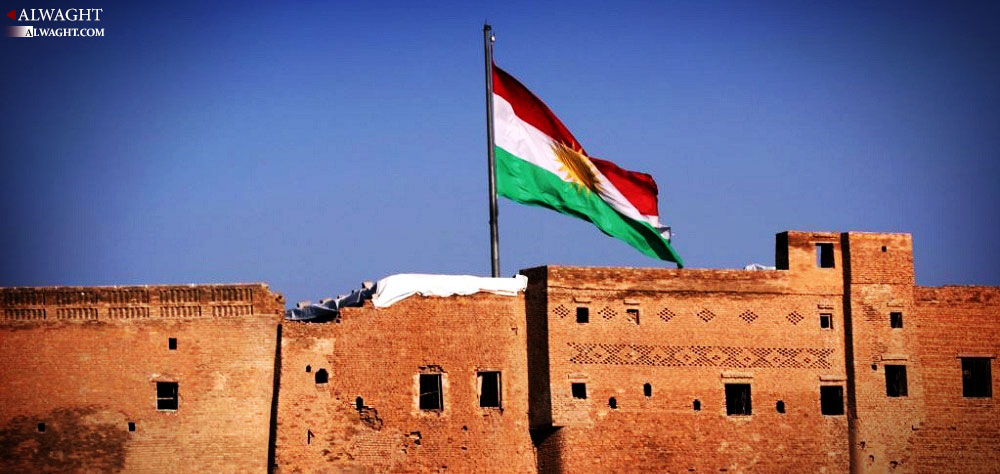Alwaght- ISIS terrorist group’s occupation of Iraqi territories in 2014 and the subsequent troubles that made the central Iraqi government busy coping with the security issues encouraged Kurds to hold independence referendum across their autonomous region in north. However, their efforts to establish an independence Kurdish state have failed to yield any result due to intra-Kurdish divisions, central government’s strong objection, and the regional and international actors' serious opposition to the idea.
However, the Kurdish parties relaunched campaign for independence on a June 7 meeting. The ethic group decided that the Kurdistan Electoral Commission set a date for the independence referendum. On June 8 Mahoud Barzani, the president of the Kurdish region, gave the 106th state order, tasking the Electoral Commission with making the preparations to hold the referendum on 25 September, 2017.
The chief of staff to the Kurdistan Regional Government (KRG) presidency Fuad Hussein noted that according to the state order given by Barzani, the referendum across the Kurdish cities as well as the disputed cities will have a single question: Are you for an independent government across Kurdistan and the disputed regions?
The announcement of the date for the referendum drew different reactions from across Iraq, including Kurdistan Region. Non-Kurdish ethnic groups of Iraq disparaged the move, calling it an illegal measure.
Kurdish groups themselves are divided on the measure. Participants of June 7 meeting, including the Patriotic Union of Kurdistan, Kurdistan Democratic Party, Kurdistan Islamic Union, and Kurdistan Socialist Democratic Party, are in favor of the September poll and support Barzani decree. Meanwhile, the Gorran party as well as Kurdistan Islamic Movement that did not attend the meeting, and are yet to issue their official stance on the process. The reports said that these two parties will have their say on the case after their negotiations with other parties before the election date. What is understandable from the two parties' media stances is that they tacitly oppose a referendum in under Barzani presidency and a closed Kurdistan parliament.
Hoshyar Zebari, the former Iraqi finance and foreign minister and a leader in the Kurdistan Democratic Party, has maintained that the referendum will strengthen Erbil position in negotiations with Baghdad but will not lead to separation of the Kurds from the country. He further said that the voting on independence would not mean Kurds would annex the oil-rich Kirkuk region or three other disputed areas– Diyala, Salaheddin, and Mosul– to the Kurdish-controlled territory.
"The referendum is a democratic process and no democracy can oppose a referendum, we are not talking about independence, we are talking about a referendum," he declared.
The analysts find Zebari comments as paradoxical, arguing the aim of the potential referendum is vague. Moreover, asking residents of disputed areas whether they want to join the Kurdish region is totally different from the Kurdistan independence issue. The Iraqi constitution does not talk about Kurdistan independence.
On the regional and international levels, influential actors are against the independence proposal. The US State Department voiced concerns over the vote decision. In a statement on Thursday, it noted that referendum will “distract from more urgent priorities such as the defeat of the Islamic State (ISIS) militants." It read that the US appreciates the Kurdistan region people's “legitimate aspirations” but that it supports a “unified, federal, stable, and democratic Iraq.”
“We encourage the regional authorities to engage with the government of Iraq on the full range of important issues, including the future of relations between Baghdad and Erbil, on the bases of the Iraqi constitution," the Reuters news agency quoted the State Department as saying.
Russia, also opposes a unilateral decision by Erbil to declare independence supports an independent Kurdish state only if that emerges with the consent of central government in Baghdad.
Iran, a powerful regional actor that shares borders with Iraq, has voiced its opposition to the independence referendum, saying the vote would lead to "new problems."
"The Kurdistan region is part of the Iraqi republic and unilateral decisions outside the national and legal framework, especially the Iraqi constitution... can only lead to new problems," Iranian foreign ministry spokesman Bahram Ghasemi said on June 10.
Turkey, too, harshly criticized the referendum decision, calling it a "grave mistake".
Turkey's Foreign Ministry said in a statement on June 9 that Iraq's territorial integrity was a "precondition" for lasting stability for the country and urged Iraqi Kurds to be part of efforts to strengthen Iraq's unity.
These objections make it clear that Mahoud Barzani and other leaders of the KRG have taken a wrong course, according to the analysts. The US State Department’s statement indicated that the Kurdish ambitions are devoid of international backing. This lack of support for the process is even concreted by strong opposition from major regional actors such as Turkey and Iran.
The Kurds themselves know well that the independence agenda will face many obstacles and is practically impossible to succeed. They know the subsequent consequences for the KRG and the whole region. Therefore it seems that he September referendum only aims to put strains on Baghdad and enhance the Kurdish position in talks covering various issues.



























